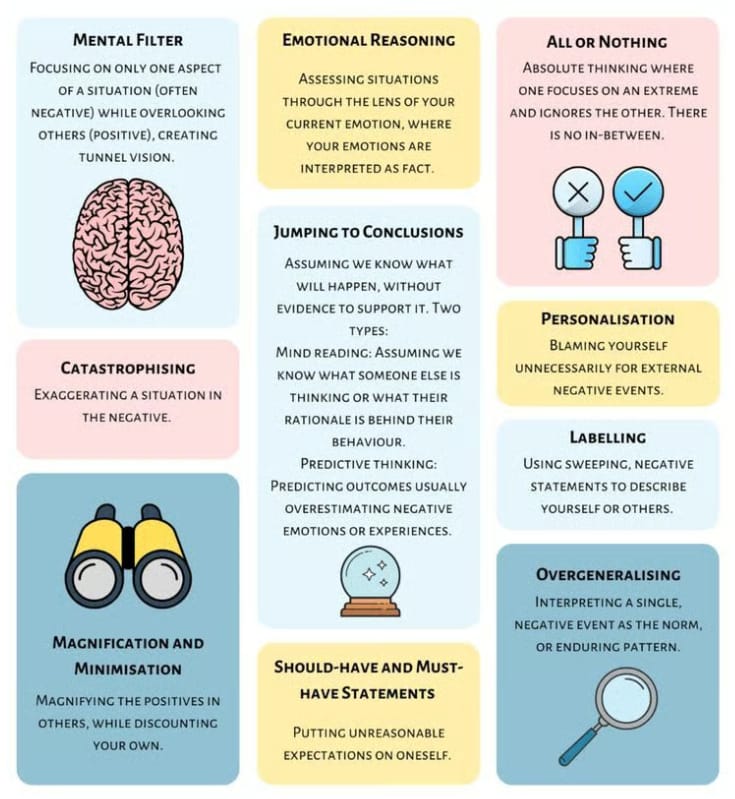- Tucson Spiritual Living
- Posts
- How to Fix "Broken Thinking"
How to Fix "Broken Thinking"
The 15 Most Common Thought Distortions (And How to Catch Them Before They Control You)
Let’s get real for a second—your mind is powerful, magical, and creative. But sometimes... it lies. Not on purpose, of course. But our brains are wired to take shortcuts to keep us safe. These shortcuts are known as cognitive distortions—patterns of thinking that seem logical but actually twist reality in unhelpful ways.
If you’ve ever felt overwhelmed, anxious, guilty, or stuck in the same emotional patterns, cognitive distortions might be playing a role. The beautiful part? Once you become aware of them, you can take your power back.
Here are 15 common cognitive distortions, what they look like, and how to gently notice them in your own life:

🌑 1. All-or-Nothing Thinking (Black-and-White Thinking)
What it is: You see things as either a total success or a complete failure—no in-between.
Example: “I broke my diet by eating one cookie. I failed. I might as well eat the whole box.”
Why it matters: This type of thinking sets impossibly high standards and leaves no room for growth, flexibility, or self-compassion.
Notice it when: You use words like always, never, completely, or perfect. Life is rarely all-or-nothing—it’s mostly gray areas, learning curves, and small wins.
🎭 2. Mental Filtering
What it is: You zoom in on the negative and completely ignore the positive.
Example: You get 10 compliments and 1 critique—but you obsess only about the critique.
Why it matters: It makes you feel inadequate even when you're doing really well. Over time, this can crush your confidence.
Notice it when: You brush off praise or good moments with “It doesn’t count,” or when one bad moment clouds your entire day.
🌪 3. Overgeneralization
What it is: You take one small situation and apply it to everything.
Example: One job rejection turns into “I’ll never be successful.”
Why it matters: It tricks you into believing your future will always look like your past—and that’s just not true.
Notice it when: You hear yourself saying “always,” “never,” or “everyone.”
🕵️♀️ 4. Jumping to Conclusions
Two main versions of this one:
a) Mind Reading
Assuming you know what someone is thinking.
→ “They didn’t text back. They must hate me.”
b) Fortune Telling
Predicting the future—usually the worst-case scenario.
→ “This meeting will be a disaster. I just know it.”
Why it matters: You make decisions based on assumptions, not facts.
Notice it when: You feel certain about something—but you don’t actually have any evidence.
🔍 5. Magnification and Minimization
What it is: You blow up your flaws and shrink your strengths.
Example: You say “I’m so dumb” after a small mistake, but when you succeed you say, “It was just luck.”
Why it matters: You’ll always feel like you’re not enough—even when you’re doing amazing things.
Notice it when: You react strongly to small problems, or dismiss big accomplishments.
🌧 6. Catastrophizing
What it is: You immediately expect the worst.
Example: “I feel tired… what if I’m seriously ill?”
Why it matters: It fuels anxiety and stress, keeping you stuck in survival mode.
Notice it when: You hear yourself starting sentences with “What if…” followed by a scary story your brain is inventing.
💔 7. Emotional Reasoning
What it is: Believing your feelings are proof of truth.
Example: “I feel guilty, so I must have done something wrong.”
Or: “I feel scared, so something bad is going to happen.”
Why it matters: Emotions are important, but they’re not always accurate.
Notice it when: You treat your feelings as facts without questioning them.
🧾 8. Should Statements
What it is: You hold yourself (or others) to rigid expectations.
Example: “I should be stronger.” “They should understand what I need.”
Why it matters: “Shoulds” create guilt, pressure, and resentment.
Notice it when: You’re feeling tense or upset, and using words like should, must, or ought to.
🏷 9. Labeling (and Mislabeling)
What it is: You define yourself or others based on one event.
Example: “I forgot to call back. I’m a horrible friend.”
Why it matters: You reduce a whole human being to one moment or mistake. That’s unfair—and untrue.
Notice it when: You call yourself or others names like idiot, loser, failure.
🤦♀️ 10. Personalization
What it is: You blame yourself for things that aren’t fully your responsibility.
Example: Your friend cancels plans and you think, “It must be because of me.”
Why it matters: You carry weight that doesn’t belong to you.
Notice it when: You take things personally without considering other explanations.
🎛 11. Control Fallacies
Two types:
a) External Control:
“I can’t change anything. Life just happens to me.”
b) Internal Control:
“Everything bad is my fault. I should have prevented this.”
Why it matters: You either feel powerless—or overly responsible.
Notice it when: You either give up control or take on too much of it.
⚖️ 12. Fallacy of Fairness
What it is: Believing life should be fair—and feeling bitter when it’s not.
Example: “I work so hard—why do they get all the credit?”
Why it matters: Life isn’t always fair, but that doesn’t mean it’s not worth showing up with love and effort.
Notice it when: You feel angry or resentful and hear yourself thinking “It’s just not fair.”
👉 13. Blaming
What it is: You assign all responsibility to someone else—or yourself.
Example: “If my parents were different, I wouldn’t be this way.”
Or: “If I were a better friend, they wouldn’t have left.”
Why it matters: It keeps you stuck in victimhood or shame, instead of healing.
Notice it when: You’re more focused on blame than on solutions.
🔄 14. Fallacy of Change
What it is: You believe others will change if you just push hard enough.
Example: “If I explain myself better, they’ll finally treat me right.”
Why it matters: You can’t force anyone to grow. You only have power over your response.
Notice it when: You’re putting more energy into changing others than supporting yourself.
🕊 15. Heaven’s Reward Fallacy
What it is: Believing that hard work or sacrifice will automatically be rewarded.
Example: “I’ve been so good—why isn’t my life better?”
Why it matters: Life doesn't always reward effort in the way we expect. Love, service, and healing are their own reward.
Notice it when: You feel unappreciated or disappointed after giving a lot.
💗 So... What Do We Do About All This?
If you notice one of these thoughts pop up, here’s a 4-step way to gently shift your mindset:
Pause and name it
→ “Oh, I’m catastrophizing right now.”Question the thought
→ “Is this true? Do I have actual proof?”Consider a kinder perspective
→ “What else could be going on?”Respond with self-compassion
→ “It’s okay. I’m human. I’m doing my best.”
🌿 Final Thought
Cognitive distortions don’t make you broken—they make you human. We all fall into these traps sometimes. The key is to catch them with kindness, not judgment.
You are not your thoughts.
You are the one observing those thoughts.
And that means—you always have the power to choose again
💫 Bonus Calming Affirmation
You can print this, cut it out, or keep it on your phone as a daily reminder.
🌸 I trust that my thoughts are not always the truth. I am learning to see with clarity and compassion. I am safe, I am growing, and I am enough. 🌸
You can also close your eyes and repeat this three times while breathing deeply.
Local Events
Finding Your Spiritual Freedom

🗓 Date & Time
Tuesday, June 17, 2025
Doors open at 6:00 PM • Event runs from 6:30 to 8:30 PM
📍 Location
Little Chapel of All Nations
1401 East 1st Street Tucson, AZ 85719
What to Expect ✨
A nurturing, heart-led discussion on releasing internal limitations and embracing true liberation
Gentle guided reflections and sharing circles to help you reconnect with your inner wisdom
Practical spiritual exercises to support your emotional and energetic freedom
This is a free, in-person event designed for open-hearted seekers ready to deepen their spiritual journey. Whether you’re just beginning or have been exploring for a while, you’ll find warmth, presence, and genuine connection.
Why Join This Gathering?
Discover how to unshackle old beliefs that no longer serve you
Tap into tools to realign with your soul’s truest voice
Connect with a community of kindred spirits—all in a safe, supportive space
Bring a journal, a friend, and an open heart. Light refreshments will be provided.
🔗 Reserve Your Spot
Spaces are limited and tend to fill quickly.
👉 Click here to RSVP for free
Soul Awakening: Exploring Hypnotherapy for Spiritual Growth

🗓 Date & Time
Thursday, June 5, 2025
5:00 PM – 7:00 PM (Arizona Time)
📍 Location
Online
What to Expect ✨
Deep exploration into the spiritual dimensions of hypnotherapy, including subconscious work, Akashic records, and past-life themes
Guided spiritual practices and energy exercises to activate & connect with your higher self
Interactive Q&A with hypnotherapist Shea Pestell—bring your burning spirituality questions
Why You’ll Love It
Unlock spiritual guidance through past-life regression
Activate your higher consciousness through loving, intuitive presence
Be held in a community of heart-centered souls, sharing insights and resonance
Bring a journal, a question, and your beautiful curiosity.
🔗 Reserve Your Spot
This is an in-person event in a small, intimate setting—space is limited and will fill quickly.
👉 Click here to claim your seat for free
What If the Answers You’re Seeking Are Hidden in a Past Life?
Sometimes the struggles we face—chronic anxiety, recurring dreams, even relationship patterns—aren’t rooted in this life at all. They may be echoes from a past life, waiting to be seen and understood.
Through Quantum Healing Hypnosis Technique (QHHT), you can access deeper wisdom from your Higher Self and begin to release what no longer serves you.
Curious to explore what's beneath the surface?
Learn more about how QHHT can help you transform:
👉 tomokouno.com
With Light and Gratitude,
Tomoko